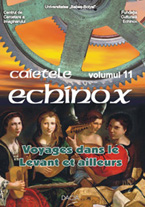Hermann Hesse’s ’Glass Bead Game’
Hermann Hesse’s ’Glass Bead Game’
Author(s): Ştefan BorbélySubject(s): Literary Texts
Published by: Universitatea Babeş-Bolyai
Keywords: Hermann Hesse; Swiss German literature; literature and decadence; utopia
Summary/Abstract: Analysing the purely male spiritual enclave depicted in Hermann Hesse’s novel ’The Glass Bead Game’, the author traces the possible origins of this game to Leibniz’s esoteric texts, in which the German philosopher imagined knowledge as the skill of detecting abstract and subtle correspondences between the different sciences and the divine plenitude of the cosmos, based on the art of a generalised calculus, or mathematics, which he called Characteristica Universalis. In Hesse’s independent school system of Castalia, the glass bead game is practised by its participants as a universal science (mathesis universalis) of elaborated European and Oriental cultural symbols and analogies, governed by the pure and abstract equations of mathematics and music. Since Hesse’s Castalia functions as a utopian, exclusively intellectual province, its vulnerability towards the everyday history and politics of the surrounding nations brings it inevitably to the bring of decline and future destruction. Hermann Hesse’s protagonist, the skilled Josef Knecht reaches the highest rank of ’Master of the Game’ (magister ludi), and then quits his office in an attempt to escape from collective mystification and inconsistency.
Journal: Caietele Echinox
- Issue Year: 2006
- Issue No: 11
- Page Range: 18-22
- Page Count: 5
- Language: English
- Content File-PDF

